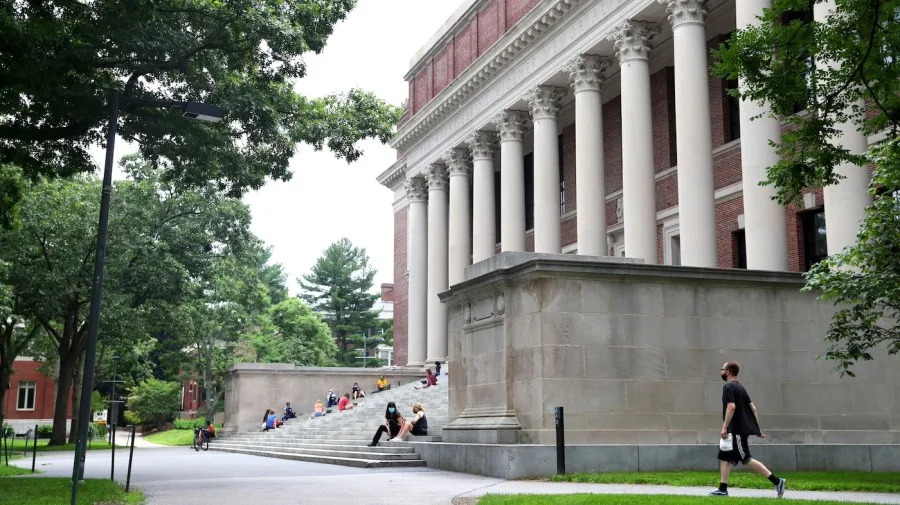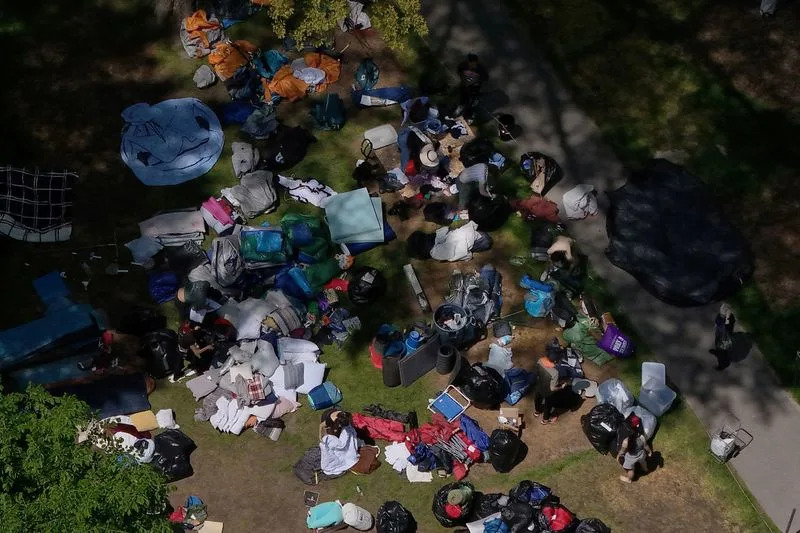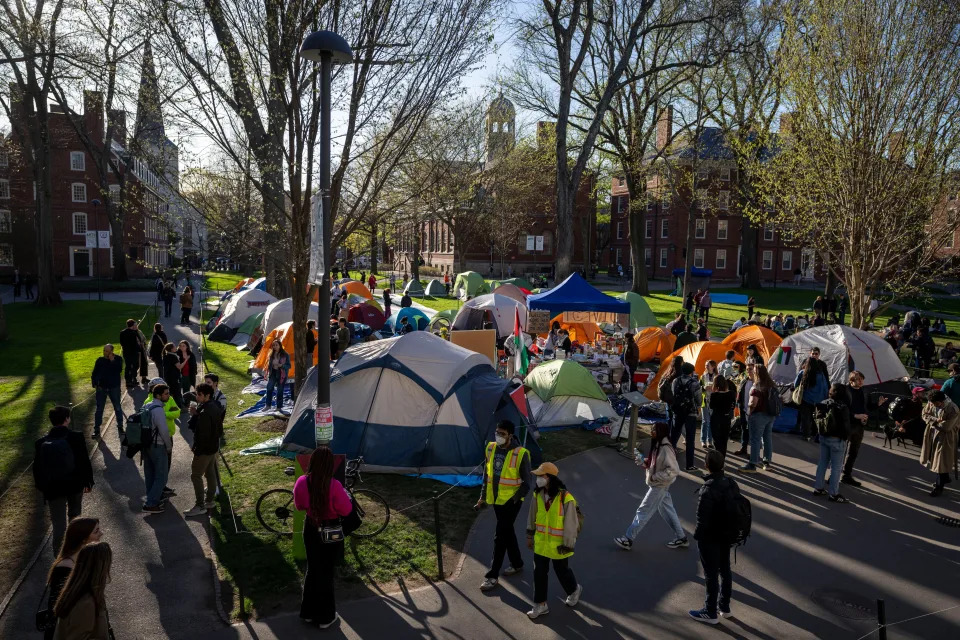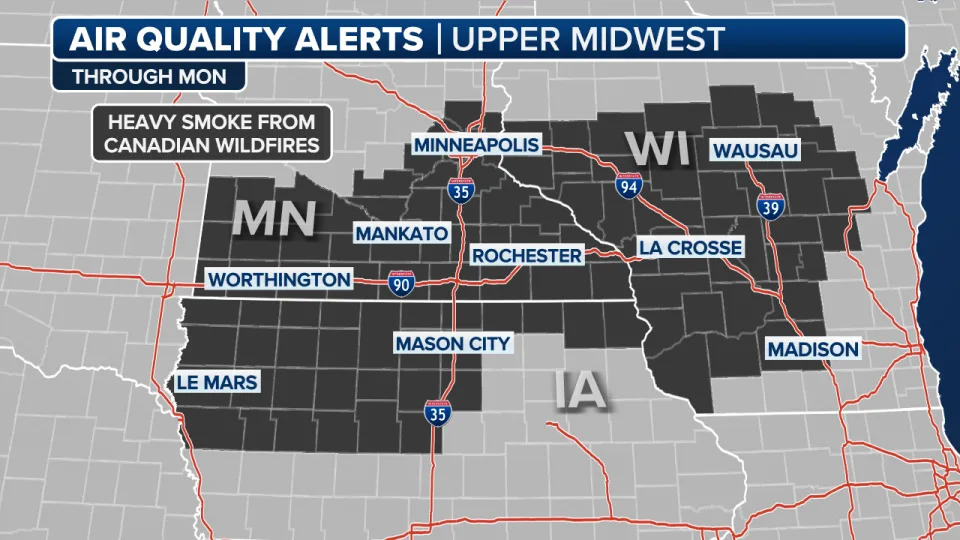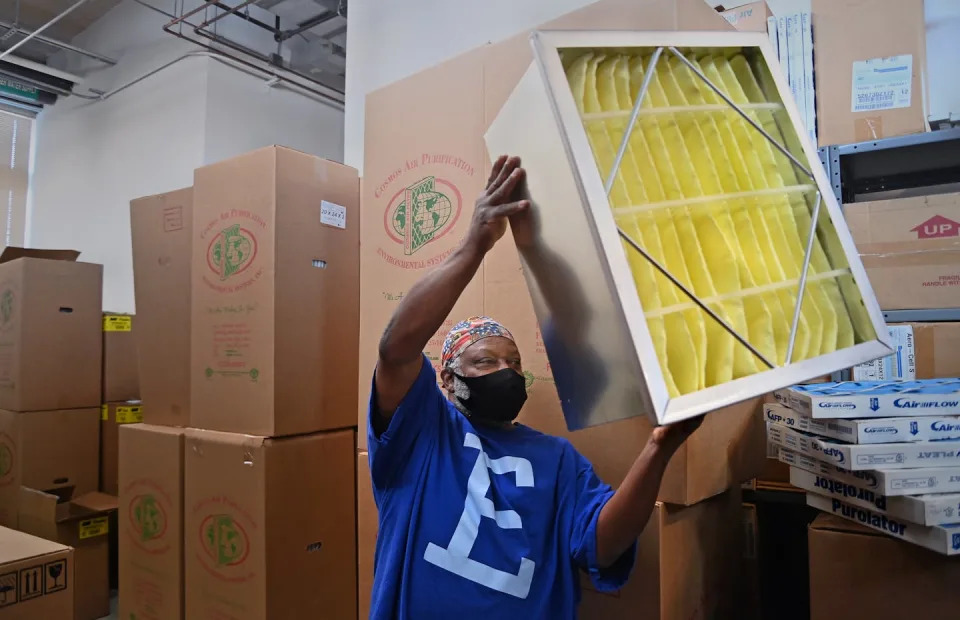Harvard students end protest as university agrees to discuss Middle East conflict
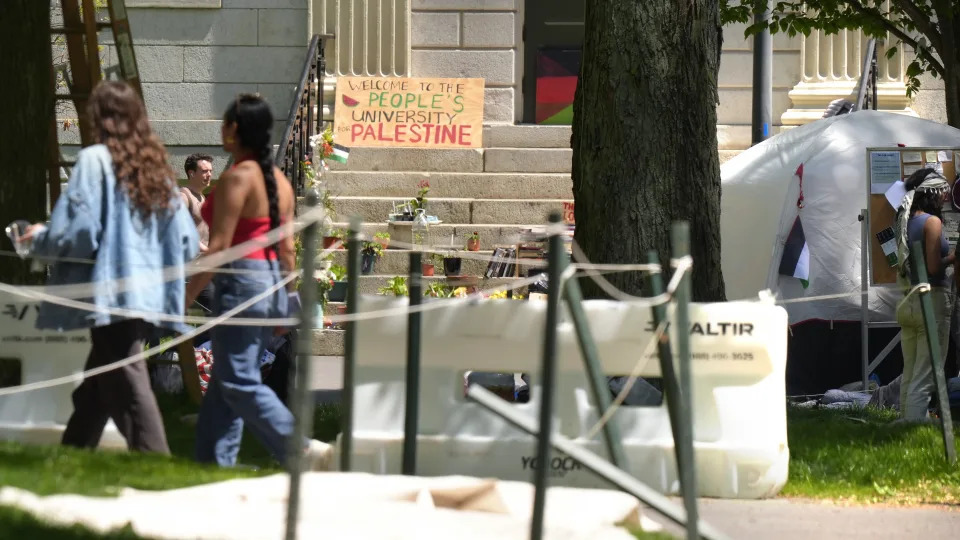
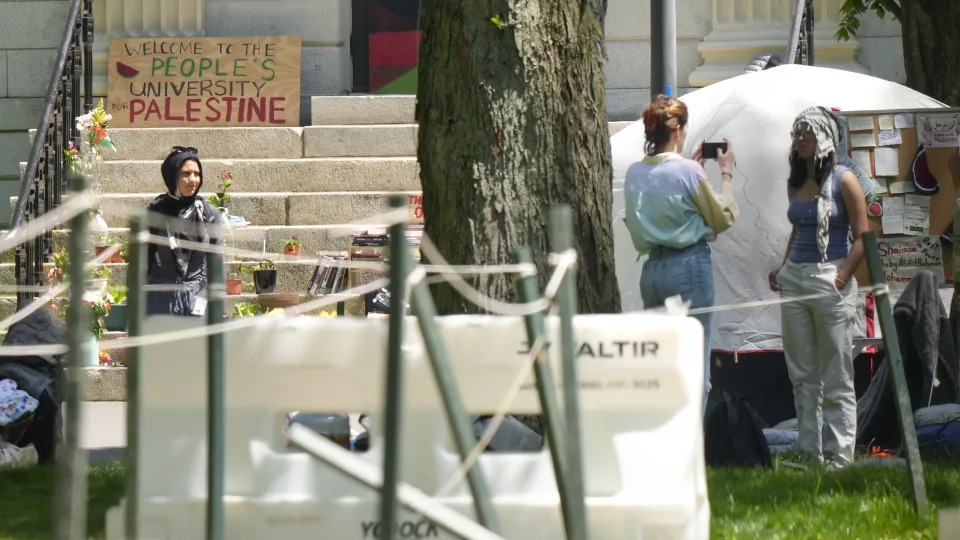
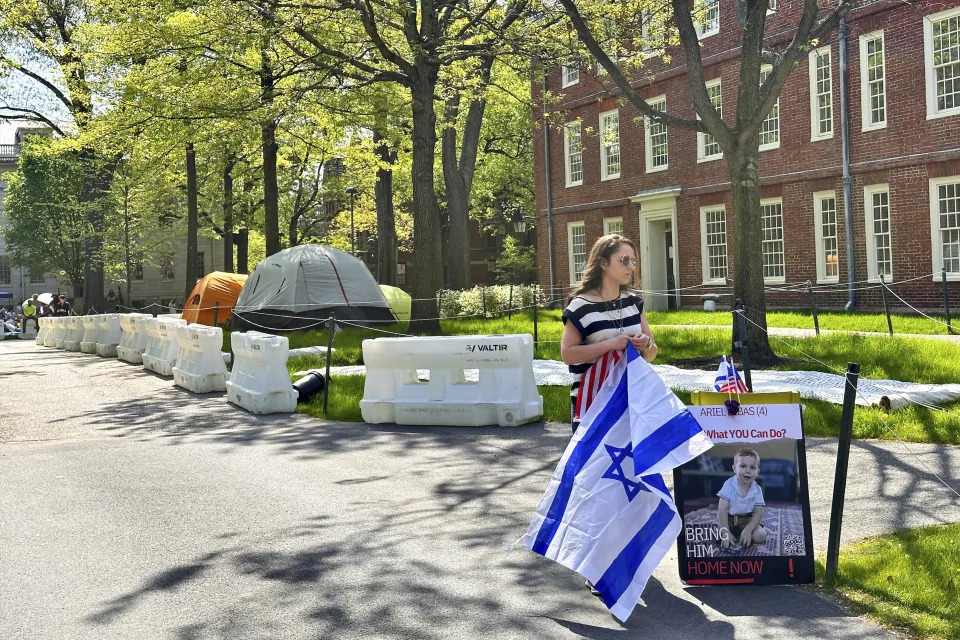
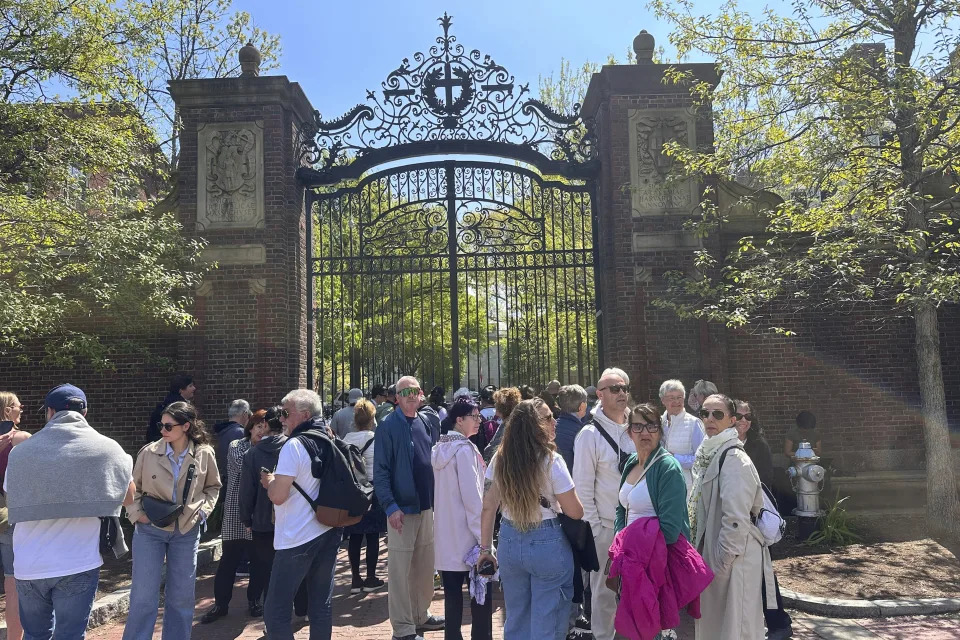
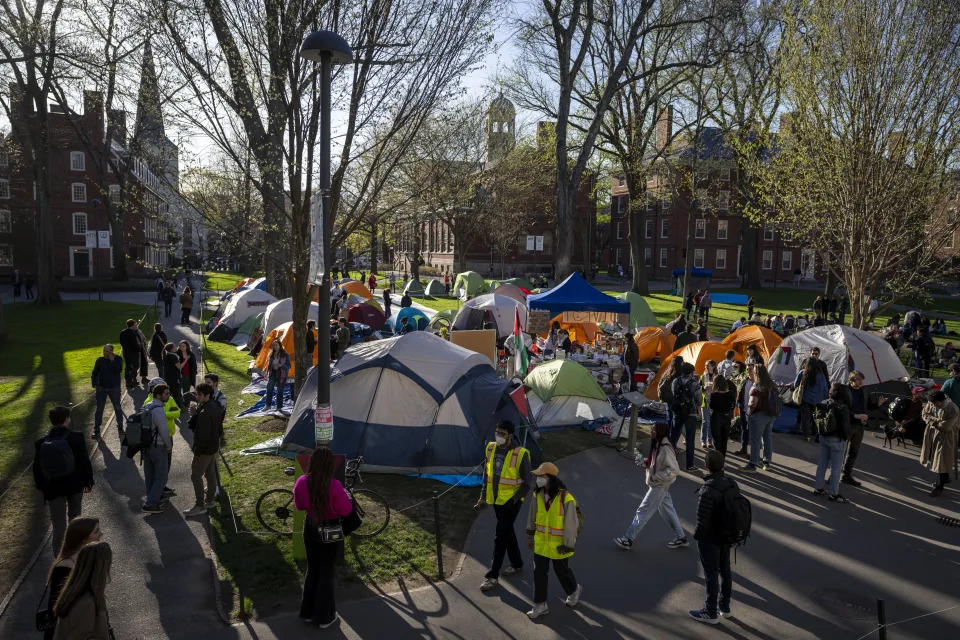
Israel-Palestinians-Campus-Protests
CAMBRIDGE, Mass. (AP) — Protesters against the war between Israel and Hamas were voluntarily taking down their tents in Harvard Yard on Tuesday after university officials agreed to discuss their questions about the endowment, bringing a peaceful end to the kinds of demonstrations that were broken up by police on other campuses.
The student protest group Harvard Out of Occupied Palestine said in a statement that the encampment “outlasted its utility with respect to our demands.” Meanwhile, Harvard University interim President Alan Garber agreed to pursue a meeting between protesters and university officials regarding the students’ questions.
Students at many college campuses this spring set up similar encampments, calling for their schools to cut ties with Israel and businesses that support it.
The latest Israel-Hamas war began when Hamas and other militants stormed into southern Israel on Oct. 7, killing around 1,200 people and taking an additional 250 hostage. Palestinian militants still hold about 100 captives, and Israel's military has killed more than 35,000 people in Gaza, according to Gaza’s Health Ministry, which doesn’t distinguish between civilians and combatants.
Harvard said its president and the dean of the Faculty of Arts and Sciences, Hopi Hoekstra, will meet with the protesters to discuss the conflict in the Middle East.
The protesters said they worked out an agreement to meet with university officials including the Harvard Management Company, which oversees the world's largest academic endowment, valued at about $50 billion.
The protesters’ statement said the students will set an agenda including discussions on disclosure, divestment and reinvestment, and the creation of a Center for Palestine Studies. The students also said that Harvard has offered to retract the suspensions of more than 20 students and student workers and back down on disciplinary measures faced by 60 more.
“Since its establishment three weeks ago, the encampment has both broadened and deepened Palestine solidarity organizing on campus,” a spokesperson for the protesters said. “It has moved the needle on disclosure and divestment at Harvard."
Harvard alumnus Rotem Spiegler said she's glad to see the protest being dismantled, but thinks it improper to reward students in part for being disruptive.
“It just should have happened a while ago, and they should have suffered consequences to what they’ve been doing here violating everybody’s space and not respecting any of the university rules that were adjusted even while they were going,” Spiegler said.
Faculty members who supported the demonstration in Harvard Yard said the students achieved “an important step towards divestment from Israel and liberation for Palestine.”
“We honor the bravery of our students, who put themselves at risk to amplify the worldwide call for Palestinian liberation that global leaders have been trying to suppress,” Harvard Faculty and Staff for Justice in Palestine said in a statement.
At the University of California, Berkeley, students demanding the school divest from companies doing business in Israel began removing their campus encampment Tuesday afternoon as protest leaders held discussions with university administrators.
UC Berkeley Chancellor Carol Christ sent the demonstrators a letter Tuesday evening agreeing “to support a comprehensive and rigorous examination of our investments and our socially responsible investment strategy.”
At Harvard, student Chloe Gambol, said the biggest achievement of the Cambridge protest was just shining a spotlight on the situation in Gaza.
“The point of a protest is to draw attention and to make a scene and make a stand and, I think, definitely achieved that based on what we see on all the news. A lot of people are talking about it,” she said.
But Howard Smith, a senior researcher at Harvard, said he was happy to see the encampment go down.
“I think the students were very misguided and, basically, historically incorrect and morally off base,” he said. “But I’m pleased that the situation at Harvard was not as crazy as in some other places.”
Protesters also voluntarily took down their tents Monday night at Williams College in Massachusetts after its board of trustees agreed to meet later this month. Williams President Maud Mandel said dialogue is the answer.
“In a year when personal, political and moral commitments are being tested, I have seen our diverse community members -- including people in the encampment, and people who question or oppose it -- try to engage with each other across differences, looking for ways to exchange views without trading insults,” Mandel said in a statement.
At the University of New Mexico, school president Garnett Stokes warned that the encampment along a busy stretch of the Albuquerque campus needed to be dismantled by Tuesday evening and those who did not comply would be subject to “institutional enforcement.”
The collection of tents and tarps had been in place going on three weeks, inhabited by a mix of activists, some students and homeless people.
Stokes' message to all students and staff acknowledged the demands of the protesters who have been advocating for a ceasefire along with disclosure of the university’s investment portfolios. She said the school was committed to being transparent.
In western New York, the University of Rochester cleared out an encampment ahead of Friday’s commencement ceremony. Most protesters dispersed voluntarily, but two people unaffiliated with the university were arrested for damaging a commencement tent, school spokesperson Sara Miller said.
- Up next
Pro-Palestinian protesters reach agreement with Harvard University to end encampment
Isabel Rosales and Devon M. Sayers, CNN·3 min readA group of pro-Palestinian protesters maintaining an encampment at Harvard University have reached an agreement with the university and will end their encampment, the group said in a news release Tuesday.
Harvard has agreed to hold reinstatement proceedings “for the over 20 students and student workers suspended by the University for their alleged participation in the encampment,” the group said.
For 60 students and student workers facing disciplinary procedures, the university has agreed to expedite their cases “in line with precedents of leniency for similar actions in the past,” according to Harvard Out of Occupied Palestine (HOOP), the organization behind the encampment.
The agreement – which the Harvard Jewish Alumni Alliance described as an example of “mis-governance” by the university – comes as college officials around the country have called in law enforcement to clear pro-Palestinian encampments and quell demonstrations in recent weeks.
Alan Garber, Harvard’s interim president, in a message to the university community, said he has asked schools to “promptly initiate applicable reinstatement proceedings for all individuals who have been placed on involuntary leaves of absence.” Garber did not say how many students were involved.
Garber also said he has asked the “disciplinary boards within each School to evaluate expeditiously, according to their existing practices and precedents, the cases of those who participated in the encampment.”
Garber “will ask the schools to adjudicate disciplinary matters promptly,” according to a university spokesperson, adding that he will also request that reinstatement requests be processed expeditiously.
Harvard University has 12 graduate and professional schools, the undergraduate Harvard College, and the Radcliffe Institute for Advanced Study.
HOOP said the university will meet with the protesters “to begin discussions on disclosure, divestment, and reinvestment.” Harvard will also engage in conversations about creating a “Center for Palestine Studies at Harvard,” the group said.
Garber said he will “facilitate a meeting with the chair of the Corporation Committee on Shareholder Responsibility and other University officials to address questions about the endowment.”
The Harvard Crimson reported May 6 that Garber has repeatedly stated that the endowment will not be used as a tool for political means. The university has also repeatedly stated its position resisting calls for divestment.
The university president and the dean of the Faculty of Arts and Sciences will also meet with students “to hear their perspectives on academic matters related to longstanding conflicts in the Middle East,” according to Garber’s message.
“I acknowledge the profound grief that many in our community feel over the tragic effects of the ongoing war,” Garber said. “There will continue to be deep disagreements and strongly felt emotions as we experience pain and distress over events in the wider world.”
The encampment at the Cambridge, Massachusetts, campus lasted 20 days, according to the group.
Harvard began placing students connected to the encampment on “involuntary” leaves of absence, the Harvard Crimson reported Friday, citing an Instagram post from HOOP.
The move came after protesters rejected an offer from Garber to avoid being placed on leave in exchange for taking down the encampment.
The Harvard Jewish Alumni Alliance, in a message to members, described the agreement as “gross mis-governance” that “undermines the stated mission” of the university. The group accused the interim president of “giving preferential treatment to students, faculty and staff whose conduct not only targeted Jews but also disrupted and imperiled the wider Harvard community.”
The alumni alliance urged members to withhold donations to Harvard, and join a campaign to “donate one dollar, and no more, to the University for the foreseeable future — not in anger, but in sadness and in hope.”
The Ivy League school has experienced a period of historic turmoil in recent months.
Claudine Gay, the first Black president in Harvard history, stepped down in January amid a firestorm of controversy over her academic writings and disastrous performance at a congressional hearing on antisemitism.
Harvard is the nation’s oldest university, with over 25,000 undergraduate students, according to the university. Harvard commencement events start May 21, according to the university.
For more CNN news and newsletters create an account at CNN.com
- Up next
Harvard student protesters reach agreement to end pro-Palestine campus encampment
Josh Marcus·2 min readStudent protesters have reached an agreement with Harvard University to end a 20-day pro-Palestine encampment that’s been occupying a central green at the prestigious university.
Harvard Out of Occupied Palestine (HOOP), the activist coalition which coordinated the encampment as part of its campaign to get the university to cut financial ties with the Israeli military apparatus, announced the deal on Instagram on Tuesday.
“Encampments are a tactic — a big and beautiful one — in a larger strategy of divestment,” the group wrote in a statement. “Here at Harvard, we believe the utility of this tactic has passed, and we have decided to re-group and carry out this protracted struggle through other means.”
“We are under no illusions: we do not believe these meetings are divestment wins,” HOOP added. “These side-deals are intended to pacify us away from full disclosure & divestment.”
Following negotiations with the student activists, the school agreed to reinstate 22 students from involuntary leaves of absence for their participation in the encampment, according to the Harvard Crimson university newspaper.
People walk past the remnants of an encampment of tents in Harvard Yard on the campus of Harvard University, Tuesday, May 14, 2024, in Cambridge, Mass (AP) The school also offered HOOP a meeting with members of university leadership involved in setting guidance for stock purchases within Harvard’s $50bn endowment.
“There will continue to be deep disagreements and strongly felt emotions as we experience pain and distress over events in the wider world,” Harvard president Alan M Garber wrote in an email Tuesday to Harvard affiliates following the deal. “Now more than ever, it is crucial to do what we do at our best, creating conditions for true dialogue, modeling ways to build understanding, empathy, and trust, and pursuing constructive change anchored in the rights and responsibilities we share.”
This spring, protest encampments have formed at universities across the United States.
University administrations have taken starkly different approaches to engaging with these demonstrations.
Some schools, like Brown University, forged a deal with protesters to end their encampment in exchange for putting forward a vote on Israeli divestment.
Others, like Columbia University, have failed to reach agreements with students, and have instead called riot police to campus to clear out the demonstrators.
- Up next
Harvard reaches deal to end pro-Palestinian encampment
Lexi Lonas·1 min readThe pro-Palestinian encampment at Harvard University announced Tuesday it would end after reaching an agreement with the nation’s oldest university.
Harvard Out of Occupied Palestine (HOOP) said in a post on the social platform X the school agreed to begin the process of reinstating students who had been suspended and offered meetings with Harvard Management Company about potential divestment from Israel. The school also will have conversations regarding the creation of a Center for Palestine Studies.
“We are under no illusions: we do not believe these meetings are divestment wins. These side-deals are intended to pacify us away from full disclosure & divestment. Rest assured, they will not,” HOOP said.
During the three-week encampment, Harvard closed its gates to the public, suspended 20 students and had more than 60 people referred for disciplinary charges, according to the group.
“At Harvard, our Schools have responsibility for our involuntary leave and disciplinary processes. With the disruption to the educational environment caused by the encampment now abated, I will ask that the Schools promptly initiate applicable reinstatement proceedings for all individuals who have been placed on involuntary leaves of absence,” said interim President Alan Garber.
“I will also ask disciplinary boards within each School to evaluate expeditiously, according to their existing practices and precedents, the cases of those who participated in the encampment,” he added.
Multiple U.S. colleges have moved to end weeks of protest on their campuses as commencement season arrives. Harvard is one of a few institutions that have cut deals with their demonstrators, a list that also includes Northwestern University and Brown University.
—Updated at 3:07 p.m.
For the latest news, weather, sports, and streaming video, head to The Hill.
- Up next
Harvard pro-Palestinian students end encampment but vow continued protest
Reuters·2 min read3 / 3Harvard pro-Palestinian students end encampment but vow continued protest
Pro-Palestinian protestors voluntarily pack up their encampment at Harvard in Cambridge(Reuters) - A group of Harvard students said on Tuesday they would peacefully end a pro-Palestinian protest encampment after the university agreed to discuss its endowment with the protesters and begin reconsidering involuntary leaves it imposed on some.
A Harvard spokesperson said the school had agreed to a "discussion regarding students' questions related to the endowment" and referred to prior statements from Harvard leaders rejecting calls for divestment from Israel-linked companies.
The Harvard Out of Occupied Palestine (HOOP) coalition, which has called on the school to divest from companies with ties to Israel, announced in an Instagram post that it would dismantle the three-week-old encampment, but vowed to "re-group and carry out this protracted struggle through other means."
"We are under no illusions. We do not believe these meetings are divestment wins. These side deals are intended to pacify us away from full disclosure and divestment. Rest assured, they will not," the post said.
The encampment at one of the country's most prestigious universities had divided the campus community, with some wealthy alumni condemning the protests as antisemitic and counter to "Western values" while others signed letters supporting the protesters.
Colleges and universities roiled by similar protests across the country have taken varying approaches, with some controversially summoning riot police to campus and others allowing demonstrations to unfold without intervention.
Harvard has agreed to begin the process of reinstating at least 22 students from involuntary leaves of absences and to expedite the cases of more than 60 students facing administrative charges for their involvement in the encampment, according to the student newspaper.
Protesters on Tuesday morning played music from a speaker while taking down their tents and removing their sleeping bags from the Harvard Yard, a central part of the campus in Cambridge, Massachusetts, the student newspaper reported.
Nearby, workers assembled the temporary stage and banner display for Harvard's commencement ceremonies next week.
(Reporting by Julia Harte; Editing by Bill Berkrot)
- Up next
Pro-Palestinian group ends weeks-long encampment at Harvard University, pledges other actions
Maria Papadopoulos·4 min readScroll back up to restore default view.A pro-Palestinian group on Tuesday ended its encampment at Harvard Yard after meetings with university administrators, but pledged to “carry out this protracted struggle through other means.”
“Harvard Beware: The Liberated Zone is Everywhere,” the group Harvard Out of Occupied Palestine said in a post on X, formerly known as Twitter, on Tuesday morning.
“After lasting beyond student move-out, the Harvard encampment has concluded,” the post said. “The struggle for Palestinian liberation goes on.”
The decampment happened as a result of meetings with Harvard University officials, the protesters said in their social media posts.
The announcement came one week after the heads of Harvard University and the Massachusetts Institute of Technology, citing increased concerns for campus safety, called on protesters to end encampments on both campuses.
Harvard officials earlier said protesters continuing with the encampment, which lasted for nearly three weeks, would face consequences, including being placed on involuntary leave from the Ivy League school.
FILE - Students protesting against the war in Gaza, and passersby walking through Harvard Yard, are seen at an encampment at Harvard University in Cambridge, Mass., on Thursday, April 25, 2024. Protest camps have sprouted up over the past two weeks at dozens of campuses across the nation. Some schools have set up encampments on campuses, including Harvard University. Others like Boston College have been calm. (AP Photo/Ben Curtis, File) “As a pre-condition for decamping, administration will retract suspensions,” the Harvard Out of Occupied Palestine said Tuesday. “Administration has also offered us meetings regarding disclosure and divestment with members of the Harvard Management Company and “conversations” regarding the establishment of a Center for Palestine Studies at Harvard.”
“We are under no illusions: we do not believe these meetings are divestment wins,” the group said. “These side-deals are intended to pacify us away from full disclosure & divestment. Rest assured, they will not.”
In an open letter to members of the Harvard Community last week, Interim Harvard President Alan Garber called for an immediate end to “the occupation of Harvard Yard.”
Garber said at the time that the continuation of the encampment “presents a significant risk to the educational environment” at Harvard and that anyone who participates in or perpetuates the encampment “will be referred for involuntary leave from their Schools.”
Harvard University in a statement on Tuesday confirmed that the “participants in the Harvard Yard encampment voluntarily ended the occupation of Harvard Yard today.”
A university spokesperson said that “Garber will pursue a meeting between encampment participants and the chair of the Corporation Committee on Shareholder Responsibility and other University leaders for a discussion regarding students’ questions related to the endowment.”
University administrators will also “meet with encampment participants for further discussion on their views and perspectives regarding the conflict in the Middle East.”
Involuntary leave notices were issued to students participating in the encampment “based on the ongoing disruption to the educational environment and resulted in students being ineligible to remain in Harvard housing and cease to be present on campus until reinstated,” according to the university.
“Now that the disruption has ended, the University will encourage the Schools to promptly process petitions for reinstatement for those students placed on involuntary leave,” the university said.
A student protester stands in front of the statue of John Harvard, the first major benefactor of Harvard College, draped in the Palestinian flag, at an encampment of students protesting against the war in Gaza, at Harvard University in Cambridge, Mass., on Thursday, April 25, 2024. (AP Photo/Ben Curtis) The ongoing encampment at Harvard has “disrupted our educational activities and operations,” Garber earlier said, adding that the actions of some protesters towards Harvard staff and passersby are “indefensible and unacceptable.”
“The right to free speech, including protest and dissent, is vital to the work of the research university. But it is not unlimited,” Garber earlier said. “It must be exercised in a time, place, and manner that respects the right of our community members to do their work, pursue their education, and enjoy the opportunities that a residential campus has to offer.”
Recently, Massachusetts Congressman Jake Auchincloss called on Garber to remove the Pro-Palestine encampment and “re-engineer” a more accepting environment on campus.
“The oppressive and overbearing culture that is antizionist does not represent the median American, nor does it represent the core values of America,” said Auchincloss, who spent the day on Thursday speaking with Israeli and Jewish students at Harvard.
Students protesting against the war in Gaza, and passersby walking through Harvard Yard, are seen next to the statue of John Harvard, the first major benefactor of Harvard College, draped in the Palestinian flag, at an encampment at Harvard University in Cambridge, Mass., on Thursday, April 25, 2024. (AP Photo/Ben Curtis) Garber issued the call to end the encampment at the university as Harvard is set to hold its commencement on May 23.
His comments last week came as another Ivy League school, Columbia University in New York, announced that it would cancel its main commencement ceremony amid ongoing protests.
The days leading up to Harvard’s planned commencement later this month have been disruptive for both students and staff at the historic Cambridge campus, Garber earlier said.
“The disruptions from this encampment at the heart of the University have been numerous. Harvard College exams and other important activities and events have had to move elsewhere,” Garber said. “Safety concerns over the past two weeks, including those raised as a result of students sleeping outdoors overnight, have required us to sharply limit access to Harvard Yard.”
In February, the co-chairperson of Harvard University’s talk force on antisemitism resigned amid concerns that the prestigious Ivy League school would not act on the group’s recommendations. That same month, Harvard condemned what it called a “flagrantly antisemitic cartoon” that an undergraduate group posted on social media.
House Republicans last month launched an investigation into federal funding for universities amid the campus protests and reports of growing antisemitism on college and university campuses.
This is a developing story. Check back for updates as more information becomes available.
Download the FREE Boston 25 News app for breaking news alerts.
Follow Boston 25 News on Facebook and Twitter. | Watch Boston 25 News NOW


